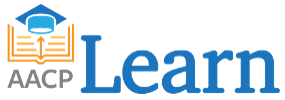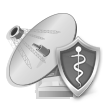- Identify ways to dismantle systemic bias, overcome organizational inertia and institutional resistance, and enhance the perceived value of inclusive excellence.
- Identify restorative justice practices to manage conflict resolution and address low psychological safety by integrating models and frameworks to foster equitable and collaborative resolutions.
- Examine the impact of bias on professional identity formation among marginalized identities, highlighting actionable strategies to foster equity in professional identity formation and professional environments.
- Construct student support strategies in pharmacy education settings (didactic and experiential) that address the needs of individuals with disabilities, religious practices, and other factors, ensuring equity, and promotion of inclusive learning environments.
- Describe approaches to support individuals in pursuing career pathways that advance health parity.
The Institute for Inclusive Excellence (formerly known as the EDI Institute), will be held virtually on May 7-9, 2025. The program is designed to support colleges/schools, faculty, administrators and others that are involved in the education of healthcare professionals with their efforts related to leveraging differences in thoughts, backgrounds, perspectives and experiences, while fostering and serving inclusive communities. The 2025 iteration of this institute will focus on the theme "Building a Resilient Future for Health Parity". Institutional teams will have the opportunity to collaborate with faculty and staff across the Academy and from their own institution to create implementation plans to further their efforts.
Register Now - https://www.aacp.org/IEInstitute2025
- Describe key components and principles of AI educational strategy.
- Develop practical approaches to using AI as an educational tool.
- Identify key ethical considerations surrounding the use of AI as an educational tool.
- Demonstrate the use of AI tools within different tracks in the curriculum (pharmacy practice and pharmacy science, experiential education and skills lab, administrative tasks).
- Design a plan to implement educational tools using AI within your curriculum based on various tracks related to education and practice.
The 2025 Artificial Intelligence (AI) Institute, an immersive virtual program will be held on January 22-24, 2025, to help members explore the fundamentals of AI in education and how to implement educational tools within the curriculum.
Over two and a half days, the program will cover approaches to using AI as an educational tool and participants will have the opportunity to personalize their learning through various tracks (didactic, experiential education, skills lab, and administration). Participants will engage in interactive presentations, demonstrations, and group discussions. Institutional teams will collaborate with other faculty, staff, and students across the academy to discuss tools and implementation strategies for using AI as an educational tool.
Register Now - https://www.aacp.org/2025AIinstitute
Agenda - https://www.aacp.org/2025AIinstituteAgenda
- Identify and apply appropriate medical billing codes (e.g., E/M, MTM) to pharmacy patient care cases. (Foundational Knowledge)
- Describe documentation components required to justify a medical billing code. (Foundational Knowledge)
- Create and utilize lesson plans and instructional materials that incorporate real-world billing scenarios and exercises to equip pharmacy students with the skills needed to perform basic medical billing tasks in practice. (How to Educate)
- Develop a plan to integrate medical billing concepts into the PharmD curriculum. (Curriculum Incorporation)
The How to Teach Medical Billing Basics: A Hands-On Workshop will prepare pharmacy educators to teach the basics of medical billing to pharmacy students as part of the PharmD curriculum. This program is intended for any pharmacy faculty member, regardless of prior medical billing knowledge or experience.
Pricing:
AACP Members: $99
Non-Members: $149
Gain access to all Medical Biling Institute 2024 contents with your purchase.
https://www.aacp.org/event/medical-billing-virtual-workshop
Agenda - https://www.aacp.org/article/medical-billing-virtual-workshop-agenda
- Connecting critical thinking to clinical reasoning and the Pharmacists’ Patient Care Process; Creating an interactive and stimulating learning environment to develop critical thinking skills
- Intentionally weaving critical thinking throughout the curriculum; Implementing strategies to enhance critical thinking in the large classroom setting
- Learning best practices to explicitly teach diagnosis as a type of clinical reasoning and critical thinking; Fostering critical thinking in light of changes in AI.
- Making connections between didactic learning in critical thinking to pharmacy practice and research; Sessions applicable to teaching critical thinking in foundational science coursework
- Assessing critical thinking
Teaching students to be good critical thinkers is something that we all aim to do, yet effective methods for teaching and fostering it can be elusive. As pharmacy education evolves and roles for pharmacists increasingly involve decision making, solid critical thinking skills will be essential for our graduates to succeed. We invite faculty and staff from all disciplines to join us in learning new practices for teaching these vital competencies. Whether you teach a large lecture course, small group skills labs, precept students in practice, or have curricular and assessment oversight, this program is for you. A variety of perspectives and types of teaching situations will be represented as we all seek to elevate our skills in producing critical thinkers able to tackle increasingly complex decisions and situations.
Continuing Education:
Earn up to 9.75 contact hours
Expiration Date: July 20, 2027
Pricing:
AACP Members: $99
Non-Members: $149
Gain access to all Teachers' Seminar 2024 contents with your purchase.
- Identify and analyze examples within our communities that promote an environment of belonging for students to thrive.
- Formulate a pathway/process for fostering student success at institutions by integrating evidence-based practices and models.
- Evaluate assessment strategies and continuous improvement processes that prioritize student and institutional success outcomes.
- Implement wellness and self-care practices among students, faculty, and staff to promote holistic wellbeing.
- Develop effective communication strategies for disseminating information on crisis management, creating a safe environment for all.
The Student Success Institute: Advancing a Culture Where Everyone Can Thrive, will discuss solutions towards fostering and advancing a culture that promotes student success. Student success is a collective effort of faculty, staff, administrators, as well as students to help create a culture that promotes and supports everyone in this rapidly changing landscape of pharmacy education and practice.
The virtual Student Success Institute will be held October 2-4, 2024, to help members gain knowledge and tools needed to advance strategies for cultivating a supportive learning environment that promotes student success. Institutional teams will collaborate with other faculty, students, and staff across the Academy to discuss solutions and implementation strategies to foster a culture where everyone can thrive.
Target Audience
AACP encourages any faculty member, students, administrator, or staff person to attend. This institute would be particularly impactful for faculty and staff involved in curriculum and assessment committees, assistant/associate deans of student affairs, and CEO Deans.
Pricing:
AACP Members: $99
Non-Members: $149
Gain access to all Student Success Institute 2024 contents with your purchase.
Student Success Institute Landing Page: https://www.aacp.org/StudentSuccess
Agenda: https://www.aacp.org/StudentSuccess-agenda
- Explain ways AI is being used in pharmacy practice and academia.
- Determine ethical considerations of using AI in academia.
- Discuss AI competencies to be incorporated into the curriculum.
- Develop policies and procedures around ethical use of AI use at your home institution.
- Modify your curriculum and assessment plan to incorporate AI use at your home institution. Execute basic AI searches with hands-on application and demonstrations of common platforms.
Target Audience
AACP encourages any faculty member, administrator, or staff person to attend. This institute would be particularly impactful for faculty and staff involved in curriculum and assessment committees, assistant/associate deans of academic affairs, and CEO Deans.
Pricing:
AACP Members: $99
Non-Members: $149
Gain access to all AI 2024 course contents with your purchase
- Appraise institutional relevant policies for necessary amendments that reflect the SCOTUS affirmative action ruling and other related areas.
- Apply self-care practices which support the DEI practitioner from the lens of the individual (self-development), team and organization leadership and allies.
- Compare and contrast recruitment and retention strategies and policies to advocate for diverse learner and faculty needs.
- Design DEI professional development offerings that align best with learners’ experiences.
- Develop policies and strategies that promote DEI to take back to your home institution.
Target Audience
Faculty member, administrator, or staff person, including participants at the 2023 EDI Institute. This institute would be particularly impactful for leaders of EDI efforts, leaders of professional development, administrators including associate and CEO deans, and faculty members involved in EDI efforts.
Pricing:
AACP Members: $99
Non-Members: $149
Gain access to all EDI 2024 course contents with your purchase
- Describe why EDI is important in pharmacy education and healthcare.
- Interpret how EDI concepts, misconceptions, and vulnerabilities are similar and different for each person.
- Prepare inclusive and equity-minded teaching and assessment strategies to incorporate at the home institution.
- Develop and evaluate curriculum and assessment activities that appropriately promote EDI at the home institution.
Target Audience
AACP encourages any faculty member, administrator, or staff person to attend, including participants at the 2022 EDI Institute. This institute would be particularly impactful for Curriculum and Assessment committee members along with Academic Affairs Deans.
Pricing:
AACP Members: $99
Non-Members: $149
Gain access to all EDI 2023 course contents with your purchase
- Describe updates in the digital health landscape.
- Identify opportunities for implementing digital health into the curriculum at the attendee’s home institution.
- 2.5 hours of mainstage content about digital health
- 1 hour of short breakout track content about digital health in academic pharmacy areas such as labs/simulations, pharmacotherapy, experiential education, and electives
- Many curated resources
Target Audience
This topic is applicable to ANY faculty or administrator. You can attend alone or with a team from your institution. We also encourage you to bring students!
- Academic Affairs administrators
- Curriculum Committee members
- Social and Administrative Science faculty
- Pharmacy Practice faculty
- Pharmacy Skills Lab faculty
- Experiential Education administrators
- Students
- Residents
Pricing:
AACP Members: $99
Non-Members: $149

What's new
By clicking “Accept Terms & all Cookies” or by continuing to browse, you agree to the storing of third-party cookies on your device to enhance your user experience and agree to the user terms and conditions of this learning management system (LMS).
USER TERMS AND CONDITIONS | PRIVACY POLICY
Accept Terms & all Cookies
MULTILEARNING platforms and tools hereinafter referred as “MLG SOFTWARE” are provided to you as pure educational platforms/services requiring cookies to operate. In the case of the MLG SOFTWARE, cookies are essential for the Platform to function properly for the provision of education. If these cookies are disabled, a large subset of the functionality provided by the Platform will either be unavailable or cease to work as expected. The MLG SOFTWARE do not capture non-essential activities such as menu items and listings you click on or pages viewed.
Performance Cookies
Performance cookies are used to analyse how visitors use a website in order to provide a better user experience.
Google Analytics and Google Tag Manager embedded tracking functionalities are used for user behavior tracking/reporting. Google Analytics works in parallel and independently from MLG's features. Google Analytics relies on cookies and these cookies can be used by Google to track users across different platforms/services.

































